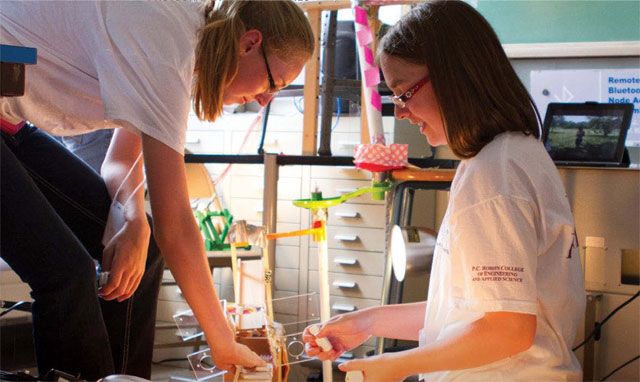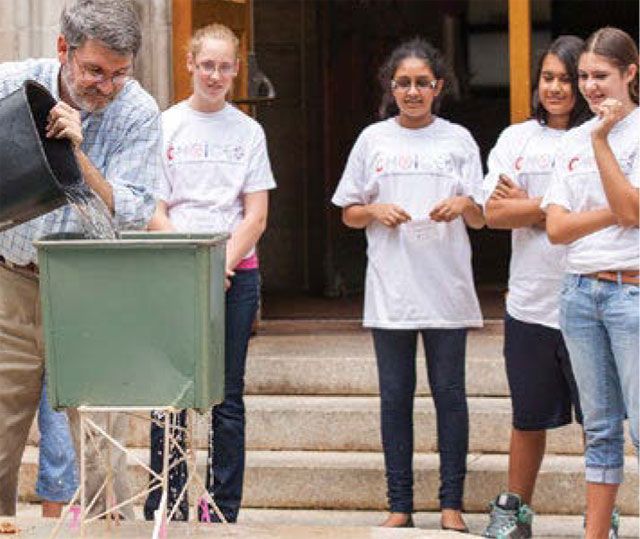Building and electronics. Math and machinery. And hard.
These are a few of the words that a group of students came up with to describe engineering. But their teacher asked them to focus on a different word: Creativity.
“Who else is creative?” he asked. “Artists, architects, musicians, writers. Engineers are more closely aligned with writers than they are with scientists.”
The teacher was William A. Best, professor of practice in electrical and computer engineering. The students were girls in sixth, seventh and eighth grades participating in Lehigh’s week-long CHOICES summer camp.
CHOICES – which stands for Charting Horizons and Opportunities in Careers in Engineering and Science – is an outreach program designed to introduce young women to engineering. In addition to the summer camp, it includes a one-day event each spring that brings about 60 girls to Lehigh’s campus.
“Through hands-on laboratory work, field trips and discussion exercises, CHOICES gives girls a chance to experience engineering,” says Best.
Women are underrepresented in engineering. Fewer than 19 percent of engineering students in the United States are women (compared with 25 percent at Lehigh), and only about 13 percent of working engineers are women.
Lehigh began the one-day CHOICES program in 1996 to try to change this; the summer camp was added in 2004. In the 16 years since, more than 1,300 girls have gone through both programs.
“Our goal was to help girls to understand that science can be fascinating and fun,” says Susan Reilly Salgado, who started the program as director of college programs under Harvey Stenger, who was then dean of Lehigh’s engineering college.
“Of course, we want all kids to be excited about science. But the primary focus here was on changing the perception that science and math are only for boys.”
Many of the girls who attend CHOICES already like science and math, but they may have few female role models and conclude that those areas are uncool to study. Furthermore, they’re typically not familiar with engineering. It can be easy to assume that engineering just involves building bridges or machines, but the girls learn that it encompasses a wide array of disciplines.
During both the summer camp and the day in the spring, volunteers from Lehigh’s Society of Women Engineers (SWE) introduce the girls to civil, environmental, electronic, computer and biomedical engineering, and materials science.
By performing fun experiments, the girls learn the applications of some of each field’s basic disciplines. And by working with the SWE mentors, they get to see what women engineers look like.
“CHOICES demonstrates to girls that they can be anything they want to be,” says Lori Cirucci, who teaches science at Broughal Middle School in Bethlehem, Pa., and sends students to CHOICES each year.
“Look at all these women who are studying engineering. Do they look like geeks to you? No, they don’t. They look like you and me. My students recognize that engineering is very doable for them and not just a guy thing.”
CHOICES puts a big emphasis on applications to show girls how engineering can make a difference in the world. This is especially important because research has shown that women tend to gravitate toward fields that help society.
Jordan Protchko attended CHOICES when she was in seventh grade. Today, she’s a junior at Lehigh, where she studies chemical engineering and is the president of SWE. She credits CHOICES with encouraging her to pursue engineering.
“It was a great day because I finally was able to interact with other girls who enjoyed science,” says Protchko. “I really enjoyed my science classes in middle school but it was hard to come by girls who thought science was cool. That day made me want to be an engineer because it showed me how much engineers help the world and affect our everyday lives.”
Young women like Protchko are essential to engineering because they bring a perspective the field currently lacks. While engineers all use the same principles to solve problems, they also bring their own experiences to bear.
The female point of view is not necessarily better than the male point of view, says Sharon Kalafut, professor of practice in computer science and engineering and SWE’s faculty adviser. But just by being different, it might lead to new ways to solve problems.
“We all have different mindsets and different strengths and weaknesses,” says Kalafut. “We need the way women think because that will make the engineering field even better.”
For proof, one only needs to look at the experience of Paige Sutton. The former president of SWE, she graduated from Lehigh in 2012 with a degree in materials science. Now she works in research and development for the Playtex feminine care division of Energizer Holdings. In other words, she helps design tampons.
“Everyone I interviewed with at Energizer was a man,” Sutton says. “They could be missing something very important, but they wouldn’t know because they don’t use tampons. Women have a different way of looking at things and organizing. That could really benefit companies and engineering firms, not just those that make products for women.”


